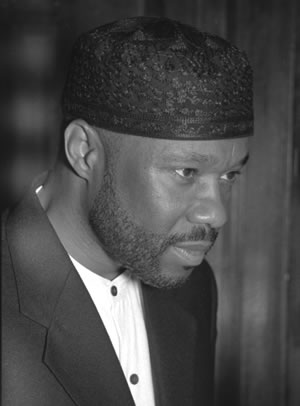Rahim Jenkins
In our nation’s capitol, newborn babies die at a higher rate than in many Third World countries and approximately one in every eight adults is in jail. Residents of Washington, D.C., develop tuberculosis 50 percent more frequently than the residents of any other city in the nation. While thousands of tourists flock to the city every week, 10,000 middle class inhabitants flee to the suburbs every year.
Rahim Jenkins wages a daily war against these forces of urban decay, which crush the spirit and thwart the potential of Washington’s most vulnerable citizens. Having turned his own experience of life on the streets into a life of activism and community organizing, Rahim is a community leader and a role model for the young people with whom he works.
Returning to D.C. after college, Rahim was “disillusioned with the city, with America, and with my life as a black man.” For several years, he worked for Amtrak and then the D.C. government, spending 13 years with the Department of Corrections as correctional officer, correctional counselor, public affairs specialist, community liaison officer, and special assistant to the director.
But Rahim had a second, less positive identity on the street. In 1986, as the murder rate escalated, Rahim began to look critically at his role in addressing D.C.’s problems and decided to make a change. “I realized I wasn’t just sitting in the traffic, I was directing it—indirectly I was responsible for the destruction around me. . .I started looking at the city and decided I would be part of the formula to fix what was happening.”
Rahim refocused his attention on his family and began to work for the Department of Corrections in a halfway house for parolees. He created projects that would connect parolees to the community—cleaning up the streets, visiting senior citizens, doing projects for schools and churches.
In 1994, Rahim was called upon to help with a crisis that would give his work a new direction. The Washington Police Department refused to investigate the disappearance of an 11-year-old Anacostia boy because he had not been missing for 48 hours. A community organizer referred the mother’s desperate plea for help to Rahim. Rahim organized a search party of men from the half-way house, and within two hours the boy was found in a field, being held naked by his abductor at knife point under a blanket. Rahim used the incident to challenge the police regulation that delayed searches for missing children over the age of ten until 48 hours had gone by. Although the police procedure was amended, police neglect in Anacostia remained.
Based on this example of the positive power a group of men from the community could bring to the streets, Rahim founded the Righteous Men’s Commission—a local alliance of urban men dedicated to helping black youths. Working on the streets to defuse tense confrontations between the police and young people and to find alternatives to violence and drugs for young men and women, the group also protested a new Act of Congress which brought the death penalty to D.C.
Rahim has helped bring the power of united black men’s organizations to other cities—Los Angeles, Chicago, and Cleveland, among others. Recently, much of his work has focused on getting young males to respect their female peers. His efforts to involve adult men in their communities led him to help organize the Million Man March.
In 1993, Rahim became the Washington, D.C., representative to the National Association of Urban Peace and Justice’s Gang Summit. He traveled widely in an effort to make peace between notorious inner-city gangs such as the Vice Lords, Gangsta Disciples, Bloods, and Crips. During one summit in a Minnesota church, Rahim witnessed a moving illustration of successful violence intervention. Two major gang leaders who had spent the previous year trying to kill each other took off the bandanas symbolizing their gang allegiances, tied them together, and threw them on the ground. “At the end of the time,” Rahim says, “there wasn’t a dry eye in the church.”
In addition to his extensive community organizing, Rahim has run for the Washington City Council twice. Although he was unsuccessful both times, he feels this has brought him closer to the people of D.C. “It’s difficult both to be in the trenches and to build an infrastructure,” he says, but he has faith in the fact that he has “part of the prescription” for change. Rahim has been one of Washington’s most outspoken critics of the D.C. Control Board and the abrogation of democracy and home rule in the city.
Rahim is raising awareness of, and demanding inquiry into, the city’s failure to investigate the violent deaths of more than 120 young black women in Anacostia and other majority-black, low-income neighborhoods around D.C. He has also encouraged a parallel organization to the Righteous Men’s Commission—Sisters in Touch.
Rahim Jenkin’s life is a powerful example of the ability to change. His demands for dignity, respect, and righteousness encourage the young people around him to change and challenge them to join in correcting the social and political system.
 Photo by Dorothea von Haeften
Photo by Dorothea von Haeften